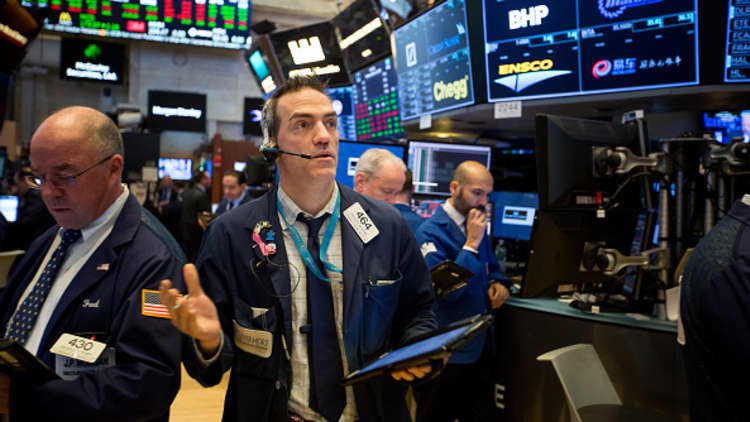
U.S. stocks closed lower Thursday after President Donald Trump announced that the hotly anticipated summit next month with North Korea was cancelled.
The meeting would have been the first face-to-face encounter between a sitting U.S. president and a North Korean leader.
"Sadly, based on the tremendous anger and open hostility displayed in your most recent statement, I feel it is inappropriate, at this time, to have this long-planned meeting," Trump wrote in the letter.
The Dow Jones industrial average fell 75.05 points to finish at 24,811.76 by the closing bell, well off a 280-point drop following news of the cancelled summit in Singapore. The shed 0.2 percent to close at 2,727.76 thanks to a 1.6 percent fall in energy stocks and a slip in oil prices.
The Nasdaq composite finished largely unchanged as losses in Facebook and Intel offset gains in Netflix and Adobe.
U.S. composite volume totaled roughly 5.3 billion shares, below its recent trend as traders leave Wall Street for the long holiday weekend.
"Trump got way ahead of himself," said Thomas Block, Washington policy strategist at Fundstrat Global Advisors. "From John Bolton to Mike Pompeo to the CIA: I think he's getting unified advice that this is premature. He loves doing things Obama couldn't do, so his gut was telling him to do it."
Trump's letter included a mix of both friendly and threatening language, including praise for North Korea's recent release of three American prisoners and a warning about the size of the U.S. nuclear arsenal.
"I think Trump got embarrassed and I think he's trying to dial back expectations. It's certainly disappointing to me, but I haven't written [the meeting] totally off yet," said Jack Ablin, chief investment officer at Cresset Wealth Advisors.
"I don't think investors would be blamed for thinking that this could go forward," he added. "It's all tied to a bunch of different things, including Chinese trade negotiations."
News of the cancellation came shortly after the Commerce Department said that it started an investigation into whether automobile imports "threaten to impair the national security" of the United States.
"There is evidence suggesting that, for decades, imports from abroad have eroded our domestic auto industry," said in a statement Wednesday.
The Commerce Department said the investigation "will consider whether the decline of domestic automobile and automotive parts production threatens to weaken the internal economy of the United States, including by potentially reducing research, development, and jobs for skilled workers in connected vehicle systems, autonomous vehicles, fuel cells, electric motors and storage, advanced manufacturing processes, and other cutting-edge technologies."
The possibility of additional import taxes isn't likely to help already stressed trade negotiations between the U.S. and countries like Japan, Germany and South Korea, all major participants in the international automobile market.
Japan's Nikkei 225 fell 1.1 percent while the Stoxx Europe 600 dropped 0.5 percent, with shares of BMW and Volkswagen each down more than 2 percent.
These broad trade statements from the White House "start with hyperbole and end with something people can accept," said JJ Kinahan, chief market strategist at TD Ameritrade. "There's a lack of volume as people start to head away for the weekend. It seems like just something to trade on."
The moves in stocks were accompanied by purchases of safe haven assets like bonds and gold.
The yield on the benchmark 10-year Treasury note, which moves inversely with its price, fell below the key psychological level of 3 percent. Gold futures, meanwhile, settled at $1304.4 per ounce, up 1.15 percent on the day.
The dollar index, which tracks the dollar against a basket of other currencies, was down 0.25 percent at 93.77.
Shares of electronics and technology retailer Best Buy fell more than 6.5 percent Thursday after the company reported quarterly earnings. Though the company posted solid quarterly comparable sales and earnings, its online sales growth decelerated.
Domestic online comparable sales growth slowed to 12 percent growth in the U.S. from a year ago, compared to 22.5 percent growth.
Best Buy's chief financial officer, Corie Barry, added that the company is not upgrading its full fiscal year outlook during the earnings conference call.
U.S. stocks finished slightly higher during the previous session after the Federal Reserve announced it would be comfortable letting inflation temporarily run above its target.
Specifically, the minutes said "a temporary period of inflation modestly above 2 percent would be consistent with the Committee's symmetric inflation objective."
Though the general tone was that inflation would continue to rise, there was disagreement over how confident the Fed should be after undershooting its target for so long, with some members amenable to letting the prices climb higher.
All signs continued to point at a tight labor market, with Thursday's data on new applications for U.S. unemployment rising just slightly to 234,000 for the week ended May 19.



